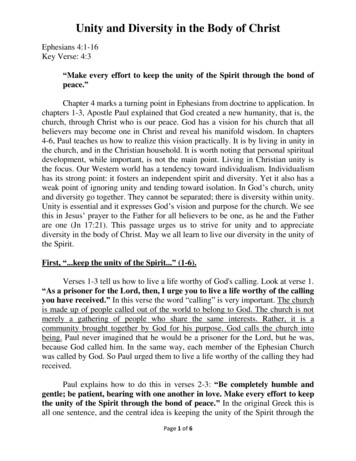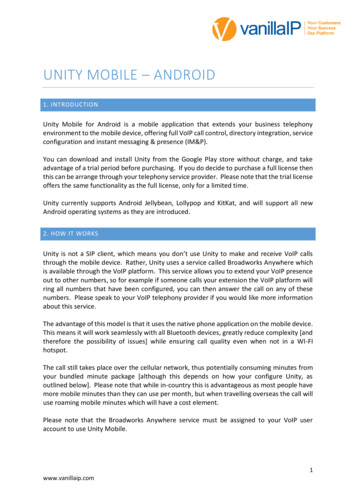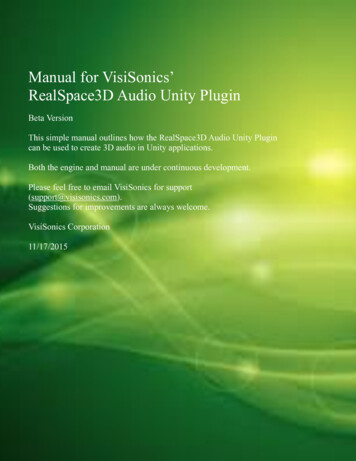
Transcription
Unity and Diversity in the Body of ChristEphesians 4:1-16Key Verse: 4:3“Make every effort to keep the unity of the Spirit through the bond ofpeace.”Chapter 4 marks a turning point in Ephesians from doctrine to application. Inchapters 1-3, Apostle Paul explained that God created a new humanity, that is, thechurch, through Christ who is our peace. God has a vision for his church that allbelievers may become one in Christ and reveal his manifold wisdom. In chapters4-6, Paul teaches us how to realize this vision practically. It is by living in unity inthe church, and in the Christian household. It is worth noting that personal spiritualdevelopment, while important, is not the main point. Living in Christian unity isthe focus. Our Western world has a tendency toward individualism. Individualismhas its strong point: it fosters an independent spirit and diversity. Yet it also has aweak point of ignoring unity and tending toward isolation. In God’s church, unityand diversity go together. They cannot be separated; there is diversity within unity.Unity is essential and it expresses God’s vision and purpose for the church. We seethis in Jesus’ prayer to the Father for all believers to be one, as he and the Fatherare one (Jn 17:21). This passage urges us to strive for unity and to appreciatediversity in the body of Christ. May we all learn to live our diversity in the unity ofthe Spirit.First, “.keep the unity of the Spirit.” (1-6).Verses 1-3 tell us how to live a life worthy of God's calling. Look at verse 1.“As a prisoner for the Lord, then, I urge you to live a life worthy of the callingyou have received.” In this verse the word “calling” is very important. The churchis made up of people called out of the world to belong to God. The church is notmerely a gathering of people who share the same interests. Rather, it is acommunity brought together by God for his purpose. God calls the church intobeing. Paul never imagined that he would be a prisoner for the Lord, but he was,because God called him. In the same way, each member of the Ephesian Churchwas called by God. So Paul urged them to live a life worthy of the calling they hadreceived.Paul explains how to do this in verses 2-3: “Be completely humble andgentle; be patient, bearing with one another in love. Make every effort to keepthe unity of the Spirit through the bond of peace.” In the original Greek this isall one sentence, and the central idea is keeping the unity of the Spirit through thePage 1 of 6
Unity and Diversity in the Body of Christbond of peace. We did not create this unity. God created this unity through Jesuswho became our peace. Through his death on the cross, Jesus destroys the dividingwalls of hostility to make us one in him. Jesus sent the Holy Spirit to dwell in usand among us to maintain this unity. So we should cooperate with the Spirit inkeeping this unity. It requires effort, for we are naturally nonchalant and indifferentdue to our sinful nature. We must make every effort, that is, do everything we can,to keep the unity of the Spirit. Unity must be a priority. Of course, we hope to domany things: raise disciples of Christ among college students, send missionaries,pioneer campuses, establish godly Christian homes, bring relief to sufferingpeople, and so on. Yet even though these things are done, if we lose unity, thechurch cannot stand. We must keep the unity of the Spirit as a first priority.The question is, how can we keep the unity of the Spirit practically? Verse 2says by being completely humble and gentle, patient, and forbearing in love (2).Humility is mentioned first. A couple months ago, Neil Armstrong passed away.He was the first man to walk on the moon, and uttered the famous words, “Onesmall step for man; one giant leap for mankind.” He was remembered forrespecting the thousands of nameless coworkers who supported the moon landing.Two years after walking on the moon he retired, and did not once try to exploit hisprivilege for his own benefit. He was a humble man. Most of all, we learn humilityfrom Jesus. In Luke 22:27 Jesus said, “For who is greater, the one who is at thetable or the one who serves? Is it not the one who is at the table? But I amamong you as one who serves.” The night Jesus was betrayed was very stressful.Satan attacked, yet his unaware disciples were competing to be number one. Intheir pride and indifference, they ignored the fact that their feet were all dirty. ThenJesus began to wash his disciples’ feet one by one, even the feet of Judas. And hetold his disciples to follow his example (Jn 13:14-15). Humility is essential forunity. Behind division and conflict there is usually pride. Most arguments thatdivide churches are not merely about doctrine, but the result of pride. On the otherhand, humility fosters unity. The words “Be completely humble.” mean to behumble through and through without any element of sinful pride. How can we becompletely humble? It seems to be impossible. But when we simply acknowledgeour sinful pride to Jesus and ask him to dwell in us, he comes in and imparts hishumility to us. So Paul boldly told the Philippians: “In your relationships withone another, have the same mindset as Christ Jesus: Who, being in verynature God, did not consider equality with God something to be used to hisown advantage; rather, he made himself nothing by taking the very nature ofa servant, being made in human likeness. And being found in appearance as aman, he humbled himself by becoming obedient to death--even death on across!” (Php 2:6-8)Page 2 of 6
Unity and Diversity in the Body of ChristWe should also be gentle. In Greek, gentleness was understood as taming ananimal. Though strong and wild, the animal learned to restrain its behavior andbecome obedient. Gentleness is not weakness. The gentle are strong in their innerbeing, yet tender toward others, especially in the use of authority. Gentlenessdescribes the character of Jesus, who said, “Come to me, all you who are wearyand burdened, and I will give you rest. Take my yoke upon you and learnfrom me, for I am gentle and humble in heart, and you will find rest for yoursouls” (Mt 11:28-29).Patience is to endure others’ bad behavior in the hope that they will improve.God is patient with us, enduring our wrongdoing without punishing us as wedeserve. God does so in the hope that we will repent (Ro 2:4). In the same way weshould be patient with others. If we become impatient and angry we can hurt othersand destroy the unity of the church. In explaining love, Paul first said, “Love ispatient” (1 Cor 13:4). We need to be patient without limit though it means we dieto ourselves. To bear with others is to endure their weak points without judging orcondemning them. We cannot practice Christ’s virtues in our own strength. Butwhen we acknowledge our need simply, Christ comes into our hearts and enablesus to imitate him.In verses 4-6, Paul explains the basis of our unity in relation to the TriuneGod. In these verses, the word “one” appears seven times. Three times it refers tothe Triune God himself; four times it refers to our experience of God. Verse 4asays, “There is one body and one Spirit.” This one body is the church (1 Cor12:13). Verse 4b-5 say, “.just as you were called to one hope when you werecalled; one Lord, one faith, one baptism.” One hope, one faith and one baptismrelate us to the one Lord, Jesus Christ. Our one hope is living hope in the kingdomof God (1 Pe 1:3). Our one faith is in Jesus Christ our Lord who saves us andreigns over us. Our one baptism is the confession of this faith. When we listen tothe testimonies of believers, although there is diversity of experience, we canusually find the same faith and hope. Verse 6 says, “.one God and Father of all,who is over all and through all and in all.” God is the Father of all Christians.He is the Sovereign Ruler of all. He is almighty, everywhere present, and allknowing. He is working in us and among us and through us. So we can say the oneFather creates the one family, the one Lord creates the one faith, hope and baptism,and the one Spirit creates the one body. The church was instituted by the TriuneGod, and it is governed by the Triune God. As the Triune God cannot be divided,so the church must not be divided.Page 3 of 6
Unity and Diversity in the Body of ChristIn speaking of unity and diversity within the Trinity, C.S. Lewis said, “InChristianity God is not an impersonal thing nor a static thing--not even just oneperson--but a dynamic pulsating activity, a life, a kind of drama, almost, if you willnot think me irreverent, a kind of dance.[The] pattern of this three-personal lifeis.the great fountain of energy and beauty spurting up at the very center ofreality.” In commenting on this, Tim Keller further adds, “The inner life of theTriune God.is characterized.by mutually self-giving love.That creates a dance,particularly if there are three persons, each of whom moves around the othertwo.Each voluntarily circles the other two, pouring love, delight and adorationinto them. Each person of the Trinity loves, adores, defers to, and rejoices in theothers. That creates a dynamic, pulsating dance of joy and love.” Here we can seethat the unity within the Trinity is a dynamic and active unity of love. This kind ofunity in love should characterize the church. As we live in relation to the TriuneGod, both personally and in community, let’s pray that we may be united in love.II. Diversity and Maturity (7-16)When we hear the word “unity,” we can easily imagine a uniformity in which eachperson seems just like others in terms of appearance, speech, and manner. We maythink of Christian discipleship as mass production, as in a factory. However, verse7 says, “But to each one of us grace has been given as Christ apportioned it.”With this verse, Paul introduces the diversity within the body of Christ. The churchis an interesting place. It is because people are so different in regards to culture,character, and especially the gifts of grace given by Christ. Not even one personamong us is just like another. Each one of us is unique, and each one of us has atleast one gift. Someone might think, “I don't have any gift from God.” But verse 7says that to each one of us grace has been given. We each have gifts from God. Wemust find our gifts, develop them and use them for the glory of God to build up thebody of Christ. We should not sit back waiting to be appointed, but use our giftsvoluntarily. The gifts of grace are given freely by Christ to each one of us. Wehave nothing to boast about and should not compare our gifts with those of others.Dr. Billy Graham was once asked if his reward from God would be greater thanothers’ in light of his achievements as an evangelist. He replied that a janitor friendwho faithfully did his duty would receive the same reward as he. He understandsthat his gift from God is pure grace.In verses 8-10 Paul explains how Christ gained the right to give gifts to hispeople. Paul quotes Psalm 68:18 calling to mind God’s descent to Mount Sinai. Itwas a celebration of God’s victory over his enemies and the redemption of hispeople. In ancient times, victors received spoils of war from the vanquished foesPage 4 of 6
Unity and Diversity in the Body of Christand distributed them to their friends and allies. Christ, who descended to the lowestplace, was exalted to the highest place. Through his death and resurrection hedestroyed all of God’s enemies and reigns supreme. He pours out the Holy Spiritupon the church. Acts 2:33 says, “Exalted to the right hand of God, he hasreceived from the Father the promised Holy Spirit and has poured out whatyou now see and hear.”The victorious Christ is the source of all spiritual gifts to his church. Verse11 says, “So Christ himself gave the apostles, the prophets, the evangelists, thepastors and teachers.” This description is unique compared to other passagesthat deal with spiritual gifts (Ro 12:6-8; 1 Cor 12:7-11; 1 Pe 4:10-11). Instead of aninventory of gifts, Paul describes them in terms of the ones who received them.Apostles and prophets witnessed the Risen Jesus in history. Evangelists preach thegospel to the ends of the earth. Pastors and teachers feed God’s people with thewords of God. Paul’s focus is not so much on the gift, but on the purpose of theGiver. Let's read verses 12-13. “.to equip his people for works of service, sothat the body of Christ may be built up until we all reach unity in the faithand in the knowledge of the Son of God and become mature, attaining to thewhole measure of the fullness of Christ.” The purpose of Christ’s gifts is to serveGod’s people and build up the body of Christ. Those who use their gifts to showoff, or gain personal benefit, are misusing them and will have to give an account toGod at the last day. Those who never use their gifts, due to fear or laziness, willalso have to give an account, like the servant who hid his talent in the ground (Mt25:14-30). On the other hand, those who use their gifts to build up the body ofChrist will be rewarded by God. The goal of exercising spiritual gifts is that we allreach unity in the faith and in the knowledge of the Son of God and becomemature. In other words, we should all become like Jesus, and attain the unity thatcomes from knowing, trusting and growing in him.In verses 14-16 Paul contrasts spiritual infants with the mature in order toencourage us to grow in Christ. Spiritual infants do not let the truth take deep rootin their hearts and they lack spiritual discernment (14). So they are easily led astrayafter human ideas and false teachings. They are vulnerable to deceivers who wantto use them for their own benefit. On the other hand, the mature are characterizedby speaking the truth in love (15a). They are deeply rooted in the truth and in love.So when they open their mouths, words of truth come out with love. If we speakthe truth without love we can hurt others and cause division. If we love without thetruth we can spoil others. But when we speak the truth with love we can all grow tobecome in every respect the mature body of him who is the head, that is, Christ(15b). In verse 16 Paul tells us how the body of Christ grows. Christ is the sourcePage 5 of 6
Unity and Diversity in the Body of Christof all things the body needs and each member is related both to Christ and to thebody of Christ. When each member does its work, the whole body grows andbuilds itself up in love. In this way the church becomes healthy and strong.In today’s passage we learned the importance of unity in the body of Christ.This unity comes from God and we are urged to keep this unity. We have learnedthat humility and love are essential virtues for us to practice in order to keep thisunity. In regard to humility, Paul said in Romans 12:3, “.Do not think ofyourself more highly than you ought, but rather think of yourself with soberjudgment, in accordance with the faith God has distributed to each of you.”With sober judgment, each of us should find and use our gift, whether small orgreat, to build up the body of Christ. We can learn one thing from ants. Ants formcolonies with divisions of labor. They can communicate with each other and havethe ability to solve complex problems. Without any strong central organization,they form castes of workers, soldiers, and other specialists. Up close, they maylook foolish. Two ants may pull a twig in opposite directions for hours, neither oneyielding or knowing what they are doing. Yet when we step back and see thewhole picture, we find them operating as a unit, collectively working together tosupport the colony. Like the ants, when each of us is humble and diligent inexercising our gifts properly, God can build up great work through us.The greatest virtue for us to practice is love. The words “in love” arerepeated three times in this passage (2,15-16). The love of Christ is crucial inbinding the body together to work well. That is why Paul said in Colossians 3:14,“And over all these virtues put on love, which binds them all together inperfect unity.” We can find an example in history from the Moravians. In 1722, asmall group of Bohemian Brethren, who had been persecuted for their faith, settledon the estate of Count Zinzendorf. They all came from different backgrounds andafter a few years disagreements arose until they were divided into warring factions.Count Zinzendorf worked to bring about unity. Then, on August 13, 1727 anamazing thing happened. As they came together to celebrate communion,repenting their sins, the Holy Spirit came upon them. They began to love oneanother genuinely. They began to pray earnestly for the salvation of the lost. Theysent out more than 3,000 lay missionaries to the nations of the world. It was thebeginning of the lay mission movement in history. When they loved one anotherthey could be united and were used greatly by God, beyond what they could haveimagined. Let’s humble ourselves, love one another and pray for unity in the bodyof Christ so that God may use us greatly.Page 6 of 6
people, and so on. Yet even though these things are done, if we lose unity, the church cannot stand. We must keep the unity of the Spirit as a first priority. The question is, how can we keep the unity of the Spirit practically? Verse 2 says by being completely humble and gentle, patient, and forbearing in love (2). Humility is mentioned first.










